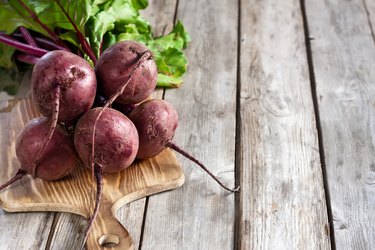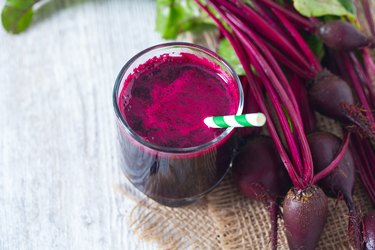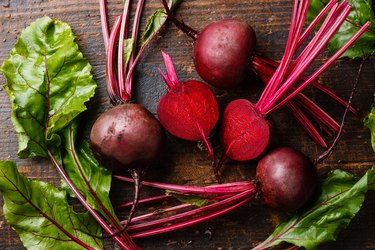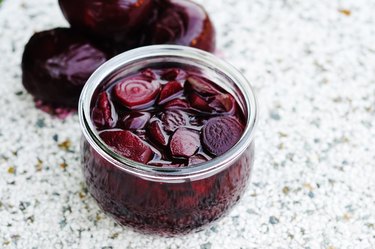
Borscht soup, grilled vegetable kebabs, vegan cupcakes — there are any number of creative and versatile ways to use the different varities of beets in sweet and savory recipes alike.
But before you nibble on a red beet recipe, keep in mind they can leave behind a surprise in your toilet bowl: red poop (or urine) that might resemble bloody stool.
Video of the Day
Video of the Day
Why Beets Can Cause Red Stool
The pigments that give red beets their distinctive hue belong to a family of compounds called betacyanins, and betacyanins aren't always entirely broken down by the digestion process, according to StatPearls. So sometimes after eating red beets, you might notice a pink to red color in your poop or pee, according to the Cleveland Clinic. When beets turn your pee red, it's called beeturia.
How Long Does This Effect Last?
How soon after eating beets will your urine or stool be red? The answer is different for everyone, because the amount of time it takes food to move through the digestive tract (called intestinal transit time) varies. Generally, the pink or red tint will show up within a day of eating beets, according to Nationwide Children's, and it should vanish within around 48 hours, according to Children's Hospital Colorado.
Is It Bloody Stool?
If the pink or red color doesn't go away after a couple days after eating beets or you didn't recently eat anything that could change the color of your poop, there could be blood in your stool, according to the Cleveland Clinic.
It's unlikely you'd actually get bloody stool from beets. Causes of blood in your poop are usually things like hemorrhoids, diverticulitis, inflammatory bowel disease, infections and colon polyps, per the Cleveland Clinic. Bloody stool usually looks bright red, maroon or black rather than pinkish red like after eating beets.
Other Gastrointestinal Effects of Beets
Do beets make you poop? Maybe not immediately, but because they are high in fiber — with about 3.5 grams per cup, according to the USDA — they can certainly contribute to healthy and regular digestion.
A small pilot study published April 2023 in Food Chemistry suggests beets might have benefits for the diversity of good bacteria living in the gut, but more research is needed to fully understand the potential gastrointestinal effects of beets.
When to See a Doctor
If you know you just ate beets and have no other concerning symptoms, the red you see in the toilet bowl is most likely nothing to worry about.
But seek medical attention right away, according to the Mayo Clinic, if you suspect you're passing blood in your stool and experience any other warning signs, like:
- severe or worsening abdominal pain
- dizziness, lightheadedness or fainting
- nausea
- pale, clammy skin
- bleeding that lasts longer than two days
- StatPearls: "Beeturia"
- Cleveland Clinic: "How Your Diet Can Affect Your Poop Color"
- Nationwide Children's: "Intestinal Transit Time: The Red Poop Challenge"
- Children's Hospital Colorado: "Stools - Unusual Color"
- USDA: "Beets, cooked, boiled, drained"
- Food Chemistry: "Effect of two-week red beetroot juice consumption on modulation of gut microbiota in healthy human volunteers – A pilot study"
- Mayo Clinic: "Rectal Bleeding"
Is this an emergency? If you are experiencing serious medical symptoms, please see the National Library of Medicine’s list of signs you need emergency medical attention or call 911.


